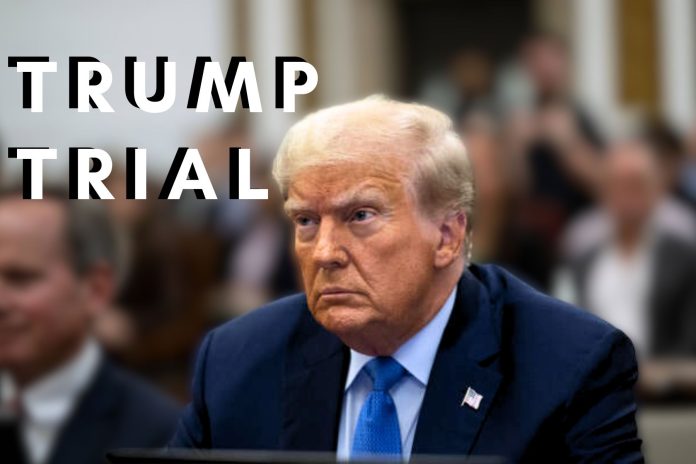In a courtroom drama that played out like a gripping political thriller, the concluding arguments of former President Donald Trump’s $370 million New York civil fraud trial marked a moment of unprecedented tension.
As the legal battle edges towards its conclusion, Trump’s unconventional approach to addressing the public both inside and outside the courtroom reveals a complex interplay of legal maneuvering and political theater.
In this exploration, we dissect the key takeaways from the final day of the trial, delving into the intricacies of a case that not only poses a serious threat to Trump’s business empire but also holds potential implications for the political landscape.
Trump’s Strategic Verbal Barrage
Donald Trump’s decision to seize the mic during closing arguments showcased a strategic move to utilize various platforms to deliver his narrative. From addressing Judge Arthur Engoron inside the courtroom to engaging with the media outside and concluding with remarks at his 40 Wall Street property, Trump strategically chose each location to drive home his points. This unconventional move reflects not only the high stakes involved but also Trump’s desire to use the trial as a stage for his political aspirations.
A Political Witch Hunt Unveiled
Within the courtroom, Trump vehemently declared the trial a “political witch hunt,” emphasizing that what transpired was nothing short of a personal attack and fraud against him. This assertion took center stage during an unscheduled moment in court, where Trump delivered a passionate speech, underscoring his innocence and casting the trump trial as a calculated effort to undermine his reputation.
AG’s Pursuit of Intent
The Attorney General’s office maintained that Trump acted with intent to fraudulently inflate the value of his assets. Andrew Amer, representing the AG, argued that Trump, as the ultimate authority, was directly responsible for actions taken by Trump Organization executives. The pursuit of a $370 million claim hinged on the allegation that Trump’s manipulation of financial statements allowed him to secure loans and insurance at more favorable rates.
Cohen’s Testimony Under Scrutiny
Central to the prosecution’s case was the testimony of Trump’s former lawyer, Michael Cohen. Cohen’s claim that Trump instructed him to manipulate financial statements to inflate his net worth became a focal point. Trump’s defense vehemently attacked Cohen’s credibility, branding him a “serial liar” and highlighting inconsistencies in his statements during cross-examination. The court grappled with the reliability of Cohen’s testimony, given his retracting statements under scrutiny.
The Political Attack Defense
Trump’s legal team echoed the former president’s claims, asserting that the case was a politically motivated attack. Attorneys Chris Kise and Alina Habba accused the New York Attorney General of pursuing a manufactured claim to further a political agenda. The trial became a battleground not just for legal arguments but also for shaping the narrative of victimization and political bias, adding a layer of complexity to an already intricate legal proceeding.
Implications Beyond Trump
In a bid to broaden the scope of consideration, Trump’s legal team urged Judge Engoron to reflect on the broader implications of his ruling. The defense argued that the attorney general’s pursuit of what they deemed a “victimless crime” could set a dangerous precedent, potentially leading to a corporate death penalty and impacting businesses throughout New York. Drawing parallels to previous cases, such as the 2018 lawsuit against Exxon, the defense highlighted the far-reaching consequences of the trial’s outcome.
Skepticism Surrounding Trump’s Sons
Judge Engoron injected skepticism into the proceedings, questioning the involvement and knowledge of Trump’s adult sons, Eric Trump and Donald Trump Jr., in the alleged fraud. The judge sought evidence proving the sons’ awareness of fraudulent activities. The attorney general’s office argued that the “head in the sand” defense was insufficient, pointing to the extended tenure of Eric and Donald Trump Jr. as co-CEOs of the Trump Organization.
The Road Ahead
As Judge Engoron contemplates his ruling, the legal saga appears far from conclusion. Trump’s attorneys have signaled their intent to appeal, challenging both the case against Trump and the conduct of the trial.
The post-trial decision, expected to include the amount of disgorgement and additional claims brought by the attorney general, underscores the complexity of the legal landscape. With Trump’s business future in New York hanging in the balance, the extended timeline of the case raises questions about its lasting impact on both the political and legal fronts.
Conclusion
The New York civil fraud trial, marked by Trump’s unconventional courtroom approach, has unfolded as a collision of legal proceedings and political spectacle. As Judge Engoron weighs his decision, the implications of this trump trial extend beyond a mere legal judgment, influencing Trump’s political narrative and potentially shaping legal precedents for businesses in New York.
In the intricate aftermath of closing arguments, one thing remains certain – the echoes of this trump trial will reverberate long after the final gavel falls, casting a shadow over Trump’s legacy and the future of business litigation in the state.





